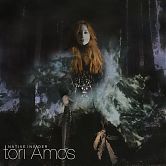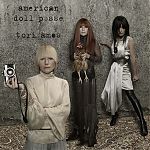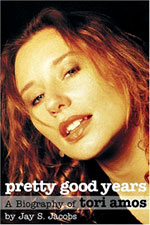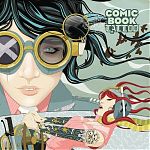- Articles
- Cherries
- Minutiae
- Q&A
- RAINN
- Releases
- Reviews
- Site News
- Them
- Toriphiles
- Touring
- TV/Radio/Web
- Video
News Archives
Keep an eye on our Twitter and Facebook pages since we often post quickie updates there when we're on-the-go.
During tours, we do our best to cover setlists in real-time on Twitter. If you want to tweet a show in, just DM or @ us on the day and tell us to watch your stream that night.
Tori is touring in 2017 to support the release of Native Invader. The European legs runs from early September through early October and the North American leg runs from late October to early December. We do not know if additional dates elsewhere will be added.

Native Invader (album, 2017)

Unrepentant Geraldines (album, 2014)

Gold Dust (album, 2012)

Night of Hunters (album, 2011)

Midwinter Graces (album, 2009)
 Abnormally Attracted To Sin (album, 2009)
Abnormally Attracted To Sin (album, 2009)
Live at Montreux 1991/1992 (DVD, 2008)

American Doll Posse (album, 2007)

A Piano (boxed set, 2006)

Pretty Good Years
(bio, 2006)

Fade To Red
(DVD, 2006)
 Comic Book Tattoo (book, 2008)
Comic Book Tattoo (book, 2008)News: Tori in Pori: The YleX Interview
While Tori was in Finland recently, she sat down and chatted with the Finnish radio station Ylex about performing in Finland, her work and other current projects. During the interview, she indicated that The Light Princess musical is currently expected to be shown in 2012 (and, as a result, that she probably will not tour again until after that), talked at length about the upcoming performance with The Metropole Orchestra in Amsterdam and mentioned a secret project that she has been approached about. While she didn’t provide many details about this project, she did say that it didn’t fit into the standard pop mold and that was one of the reasons why she found it an intriguing possibility.
You can listen to the interview on YleX’s website.
Thanks to the fine folks at toribr for alerting us to it!
Update: YleX also reported on Tori’s performance at the Festival and, even if you don’t understand Finnish, the photo gallery there is worth the visit!
Update: Thanks to SweetOnes from the yessaid forum, here is a transcription of the interview:
I: Alright, so, Tori, you’ve been to Finland before. Do you have any memories of your last gig here?
T: I do. I have a lot of memories. I remember the people being lovers of music, and we had a storming gig – it was an outdoor gig – and it was light for very, very, very late, and that has a different kind of atmosphere. It affects everybody in a very different way.
I: I was there. I saw you.
T: Oh, you were there?
I: Yeah. It was a nice gig. Your performances seem to be very well-planned and executed. How much effort do you put into the performance to make it an art piece?
T: Each show is different because – I just wrote the setlist for today about 15 minutes ago, and sitting right over there – because I have to get a feel for the energy of the place and the day, and until you’re experiencing it yourself – sometimes you have an impression, I was getting an impression of the land while riding from, coming in from Helsinki. So tonight’s, today’s show will be very different from the one I did a couple of days ago in Amsterdam, and it should be.
I: How does Finland affect your performance? How do you spice it up?
T: Well, I think that people, like I said before, that they show that they are lovers of music. They’re not afraid to express themselves. And there are different places you go in the world, where people are more reserved and conservative and feel like they can’t express themselves as much – and that doesn’t mean that they don’t care, but it does mean that they aren’t as effusive. Whereas Finland, the people are not afraid – or they don’t let themselves be intimidated by their emotions – and they let themselves express them. So that always makes a good show.
I: One of the reasons I respect you as an artist [is that] I really love the way you interpret songs. How do you get in the mood, the right mood, when you’re in studio?
T: Well, you have to put yourself in that space, and sometimes it takes many days of tracking to get, to be the right woman mentally and emotionally in order to carry a song. Sometimes the songs are created while I’m traveling the world and in a certain circumstance, and then months later you’re trying to conjure that atmosphere, and you have to be very precise about it. You have to get your chakras aligned, and your head space [as well]; sometimes I really have to talk myself into the story and the events surrounding the song.
I: Do you kind of use, like, method singing? Do you think about your life when you sing?
T: That’s an interesting question. I use archetypes a lot, mythological archetypes, and that means that I’ve been working on different aspects of the feminine character now for over 30 years, and I was doing this – I started in my teens, investigating it. And in that way, you’re not just pulling on the women you know in your life or women on television now; you’re pulling on personalities and character types from thousands of years that might not be acceptable in society today, or might not be qualities that we appreciate. Such as Artemis – who was one of the Greek goddesses – that wasn’t with a man, didn’t want to be with a man and was very much about the huntress and being close to nature and animals. And that made her whole. So there are different female energies I pull on for different performances.
I: I loved how you used that on your American Doll Posse record. Speaking of that, are you making another concept record sometime soon?
T: Well, I’ve been approached to do a really different kind of project. It’s not announced yet. Where I am in my life is, looking at projects, just step-by-step. And something fascinating has kind of… I’ve been approached. And I’ve never done something quite exactly like this. I’ve been developing a musical which, hopefully, will be happening in 2012 but this is very different than that. This is something that I would perform. And so… it’s high-concept, and, um, yeah, I think the next thing I do will be very concept-oriented.
I: But you can’t speak about it.
T: Not yet.
I: Not yet.
T: No.
I: So, something fascinating is happening but you can’t talk about it, and you’re making a musical. When will you have a new album out? Will it be this fascinating thing?
T: Well, It could be this fascinating thing but that’s if… it’s not a traditional contemporary pop record like you’re thinking about it. That will be after the musical, because I think… I cannot tour “a new Tori record” until after the musical, and the musical will be up and running, I don’t know, late Spring 2012, hopefully. Hopefully. And so plans would, I guess, be for a Tori thing in late 2012 or early 2013. But this little something – again, it’s very different, it’s not pop-driven, and that’s why I’m fascinated, because sometimes, um, as a composer and as a pianist, the structures – pop structures – can be very confining, especially after working on the musical. So, um, fingers crossed that it happens!
I: Have you planned any collaborations with people? Because you haven’t done a lot of duets or stuff like that.
T: What’s a really exciting collaboration is with the Metropole Orchestra coming up in October. And this evening is the first time I will have ever played with a live orchestra – performing. It’s one thing to be in the studio with an orchestra. It’s a whole another thing to be playing live with them a full program. And so, I’m in training already for this one night in October. I have to train really, really hard just to have the breath control to keep up with the orchestra. When I’m with the band, I can look over at Matt Chamberlain and just… he knows, “Give me two bars. I need to breathe before I start the second verse.” But with an orchestra, the arrangements will be set in stone before that night, so we have to work all this out and I can’t improvise like I normally do. I have to really hold true.
I: Yeah, that was my next question. How much do you improvise during gigs? Because it all seems so very planned and constrict in a way.
T: Well, Husband says to me, “Why are you giving a setlist, because you’re not even holding to it?” He says, “You know, what they’re good for is giving them to people at the end of the night to see, for people to see how, um, we were just playing kind of ‘guess what song my wife’s going to play tonight’.” And so, I said, “Well, at least you have something to start with.” It’s a jumping-off point, a setlist, when I’m playing alone. When you’re playing with the band it’s a little different because Matt has to start the songs or Jon Evans would start something – and with the orchestra, the Metropole in October, the setlist will have to be designed and lined up ahead of time. But when you play alone, part of the performance is to react in the moment. And if you think— I mean, I changed this set about 20 times before I gave it to Barry. Husband just walked out before you came in, he does front-of-house sound, and he just said “you are not just going to stick to this tonight, wife,” and I think I just might, just to prove to him that I can.
I: Just to poke him a little.
T: Just to poke him, yeah.
I: You’ve done a lot of covers. Any new covers planned?
T: Oh yeah. I’ve got one tonight that I’ve been doing on the tour. I like, I like doing things… and I only do covers of songs that I think are great songs, and I think it’s important to try and put your own interpretation [on them]. Otherwise, why not let the original stand?
I: Yeah.
T: So I always try and just give a little bit of a twist, even if it’s a Joni Mitchell song, which is closer to, say, what I do than, for instance, an Eminem song or a Nirvana song.
I: Joni Mitchell was – is – one of the great ones of her generation. I think you’re one of the great ones of your generation. What do you think about new female vocalists that have come up in the 21st century?
T: Well, people have asked me this, and I think that, to give them… we need to be fair and supportive of all of them, because it’s too early to say which ones are the voices of their generation. You need, you need hindsight to do that. They might be speaking to people that year, but in order to look back and say “wow, this gal influenced a whole ‘nother generation” – it’s a little bit too early to do that, and I’ll tell you why we have to caution ourselves to do it, because you might ignore a composer/songwriter/singer who has great potential but wasn’t supported by, say, their mentors. I remember a long time ago – not to mention names, because that doesn’t help anybody – but this happened when I was just coming out, and I had great respect for this person – and no, we haven’t mentioned her name, so no, it’s not Joni – and this person mentioned a whole lot of
people that were coming out in the early 90s, but she didn’t mention my name in an interview.
I: Aww.
T: And the thing is, I’ve had a big career and a long career and I’m still going, and some of the people she mentioned haven’t toured in a while and don’t make records anymore, and you think, well, you know, we can be premature. And so I want to support them all.
I: Last question. I’m interested in this topic so… I think Lady Gaga is the hugest thing right now. What do you think about her?
T: Well, you know, I think a great entertainer’s a great entertainer. And it’s exciting to have entertainers. I think it’s important that, that we allow entertainers to evolve, and because it’s so – if you think about it, a Bette Midler, somebody who is still performing now, she’s had a career of what, over 30 years, 40 years?
I: Yeah.
T: To be able to do that, performing that long, she’s had to evolve. And as you get older, we have to support our females as they get older, because you can’t be doing what Lady Gaga’s doing… she won’t be doing it exactly like this in 20 years’ time. So it’s allowing her to evolve, and the public supporting her as she grows and changes, because what I like to see entertainers that do, do transform and have big long careers that you can grow old with. That’s what I think is exciting. And we’ll see what she chooses to do, because you can’t just go for shock factor.
I: Yeah.
T: Right now, the shock factor’s working. But when you’re 37 years old, 40 years old, that kind of shock factor of hanging upside-down and showing your knickers and playing piano with your teeth, it’s just not as attractive.
I: And how many outfits can you have that you need to wear?
T: Well, that’s why I’m just saying we need to – once that’s done, then the music, I’m hoping that the music will be enough to keep people there, and not just the shock tactics.


